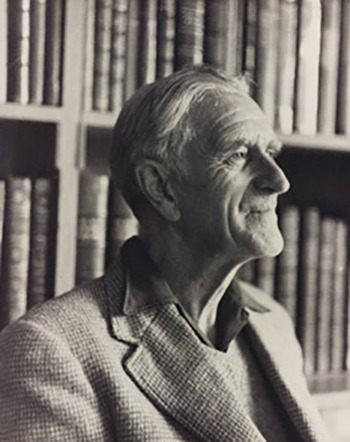
Pictured: Geoffrey Keynes
The word ‘lumpectomy’ was a surgeon’s insult.
The surgeon Geoffrey Keynes could arguably be considered the patron saint of innovation. In 1922, Keynes, based at Barts Hospital, in London, developed the lumpectomy for breast cancer.
He did so in the face of global ridicule and hostility from fellow surgeons. He was swimming against the tide of orthodoxy, which he described as a religion that could not be easily challenged.
The accepted practice for dealing with breast cancer, developed by the all-powerful American surgeon William Halsted, was the ‘radical mastectomy.
The ‘Halsted Procedure’ was revered. This physically deforming operation involved removal of the breast tissue, skin, nipple, axillary lymph nodes and the underlying chest wall muscles.
It caused a great deal of psychological upset in many who underwent the procedure. It was a horrendous – but no one challenged it. Keynes – the brother of economist John Maynard – began using local excision and radiation therapy to treat breast cancer.
More than 70 percent of his patients survived five years – his survival rates were the same as those patients who underwent the Halsted operation, yet without the horrendous side-effects massive, debilitating surgery. For his pains he was ridiculed.
The Halsted brethren nicknamed the procedure the ‘lumpectomy’ – a low-minded joke.
In his autobiography, Keynes wrote: “A built-in dogma of thirty years standing dies hard, and I was regarded with grave disapproval and shaking of heads by the older surgeons of my own hospital.” Keynes then went on to develop new blood transfusion techniques which saved lives in WWII.
The Saatchi Bill is designed to support doctors who want to change things for the better but fear doing so because culture and law is against them.
What has the Saatchi Bill got to do with culture? How would it help a modern-day Keynes?
Innovation is change and change is uncomfortable. The law is one barrier to change, and it is a barrier that engenders and encourages a wider culture of inertia.
Changing the law, will encourage more doctors to innovate, and to pass on the sense of enterprise to others around them.
They in turn will pass on that enthusiasm and sense of hope that incurable diseases can be treated.
The Bill will be a fire starter.
Sign the petition for the Medical Innovation Bill: http://chn.ge/1pqY6lS



